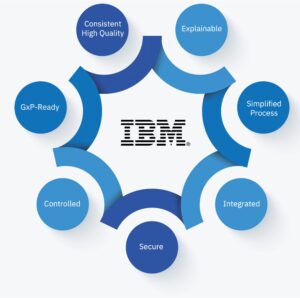About cookies on this site Our websites require some cookies to function properly (required). In addition, other cookies may be used with your consent to analyze site usage, improve the user experience and for advertising. For more information, please review your options. By visiting our website, you agree to our processing of information as described in IBM’sprivacy statement. To provide a smooth navigation, your cookie preferences will be shared across the IBM web domains listed here.
Artificial Intelligence
Reducing the time taken to write regulatory submissions – Introducing our Accelerator
5 November, 2024 | Written by: Dr. Nicole Mather
Categorized: Artificial Intelligence
Share this post:
The Case for Generative AI in Regulatory Acceleration
Generative AI and automation are now enabling digital transformation across biopharma, allowing radical reshaping and automation of core processes – and focusing human effort where it is required. Companies embracing this approach across the whole organisation are deriving significant competitive advantage and transforming the way work is done – for example driving up to a 75% turnaround time acceleration from last patient visit to regulatory submission.
Accelerating products to market is critical. As regulatory requirements increase, a fundamentally different approach is required to synthesise complex information at pace – and here the promise of generative AI driving value has truly been realised. Using our accelerator, including a series of generative AI agents as digital workers, we can use AI to augment human intelligence, drafting clinical content for documents in minutes instead of hours.
We used generative AI-based Microsoft Azure AI Studio and the AutoGen framework to create a flexible Multi-Agent workflow generating a 75-90% first draft for technical writers to review and finalise.
Unlike in use cases from other industries, the first draft on regulatory documentation needs to be fully fact-based and traceable to clinical evidence and sources. Creating a series of agents or “digital workers” focused on addressing the different steps but able to interact with each other enables a coherent, consistent approach which mitigates hallucination, is fully traceable, and allows overarching monitoring and compliance underpinning transparency and accountability. Our approach ensures breaks in the process for a human-in-the-loop to manually review and edit as required.

At IBM, we design pioneering generative AI approaches, delivering robust, enterprise-scale digital transformation as the norm. We invest in developing secure, explainable, ethical approaches to AI, central to our core value of trust from the companies and the people we serve.
1. IBM generative AI and Life Sciences
IBM has been a leader in developing and applying AI technologies to transform businesses since its inception. We co-create AI strategies in partnership with clients bringing innovation and a depth of engineering expertise to empower teams with cutting edge solutions across a variety of approaches including Microsoft AI studio, via Hugging Face or using our IBM Watson X toolkit.
Our IBM Life Sciences teams work with all of the world’s top 20 pharma companies with over 13,000 industry-qualified, experienced consultants around the world. From R&D acceleration to patient monitoring, we focus on speeding products to patients and driving productivity through the value chain.
2. Our impact on generative AI in Life Sciences
In IBM Research, our teams have worked to develop an in-house Biomedical Foundation Model through which we leverage multimodal data to accelerate target discovery, biologics discovery and small molecule discovery. Current work includes generating structures for potential anti-virals for SarsCoV-2 and optimising the lipid nanoparticles for mRNA viral encapsulation. Our teams work in partnership with organisations from Moderna to the Cleveland Clinic. We recently open sourced much of this work via Hugging Face https://research.ibm.com/projects/biomedical-foundation-models
In IBM Consulting, we have focused on business acceleration at enterprise scale with quantifiable results across the Life Sciences value chain. We have delivered significant business value in multiple organisations including delivery of production-ready, -GxP-validated systems. Our generative AI enabled transformations include driving 40% productivity in pharmacovigilance processing, focusing effort on high-impact AEs and authoring safety reports. Work for a major health insurer’s call centres used generative AI- enabled chat bots to provide a 90% reduction in effort to retrieve answers for patients, with a reduction in time taken from 3 minutes to 10 seconds.
3. The need for medical writing and regulatory content authoring
Authoring regulatory submissions is a complex process including the synthesis of trial protocols, participant information and outcomes data ranging from text to tables, charts and graphs. Highly-skilled resources are required to carry out the drafting but this can give inconsistent outputs due to the complexity of the task. Accelerating the pace from database lock to submission of regulatory documents is of increasing importance as companies compete to be first to market, enabling patient access and driving revenues.
Generative AI is well suited to enhance productivity in Life Sciences R&D. Automated authoring of first drafts of regulatory documents can be delivered via a secure and controlled approach while improving consistency. This allows people to focus on the more interesting task of reviewing and refining drafts with breaks in the automated process for a human-in-the-loop so that the necessary reviews are completed. Creating an audit trail for the drafting allows explainability and underpins information provenance. This approach radically reduces the time taken to draft documents with a 75-90% ready first draft being completed in minutes rather than multiple hours.
4. Our Approach
Our teams have partnered with Microsoft using Microsoft AI Studio to develop a Multi-Agent system. This allows a series of agents or digital workers to interact and collaborate to accelerate content authoring for complex clinical documents. Each agent can be an expert in a particular task within the system, giving greater robustness through mutual verification. This approach supports flexibility and scalability with the option to add further agents with knowledge of a particular domain, document or input modality.
Our architectural design allows retrained and fine-tuned agents to use organisation or industry-specific information such as ICH guidelines, target templates and prior examples of input source documents, outputs and regulator feedback to hone their delivery. Our solution means that users can see agent interactions, and understand the reasoning through which content was generated, and building trust in the process. This feature is designed to support the regulatory requirements for explainability.
5. Our Accelerator: Content Generation in Regulatory Writing

We have deployed content generation capability, such as this, within top-10 global pharma to accelerate the writing of clinical documents. This approach is focused on six key steps. Firstly, secure login to ensure system integrity. The author can then select the report template and source documents, working section by section. In the third step, the document is generated using AI – taking minutes rather than hours. Our system creates checks to reduce hallucination and validate outputs. The human reviewer checks the outputs as well as tracing their creation. Specific elements can then be reviewed and iterated in a controlled fashion. Finally, the completed report can be integrated into the organisational systems.
6. Conclusions
Our accelerator uses a scalable approach which can be used to transform the process of clinical document authoring, reducing manual effort while including controls which support security, explainability and mitigate hallucination. Companies using this approach are radically accelerating their business processes, driving R&D to deliver impact faster.
Next Steps
To discuss how our IBM Life Sciences Consulting team can transform your business, please contact:
Dr Nicole Mather Lars Boehm
IBM Life Science Lead Life Sciences Industry Leader
London, UKI Basel, CH
Nicole.mather@ibm.com lars.boehm@ch.ibm.com
Further Information
1. IBM Impact transforming Business with generative AI
IBM has been a leader in developing and applying AI technologies to transform businesses since its inception. As the only large technology company with a global consultancy inside of it, we can pair people with AI to help our clients outpace the competition – the science of consulting. We see IBM as our client Zero, we apply the technology to ourselves first.
We develop AI strategies in partnership with clients, using our IBM Garage methodology to identify challenges, co-create solutions with clients and identify key value levers. We bring a depth of engineering expertise combined with innovation to create cutting edge solutions across a variety of approaches including Microsoft AI studio, via Hugging Face or using our IBM watsonx toolkit. We design in security, trust and ethics as standard and enable joined-up organisation-wide governance systems. We keep the goal of enterprise transformation central to our method, enabling a design and build approach you can roll out and monitor at scale across your organisation.
This formula has had a transformative approach over the last 18 months, bringing to life the opportunity to create business value at scale. For example, we have created an Azure-based enterprise-wide source to pay platform, fully integrated end-to-end. This uses intelligent workflows that combine data, generative AI, Process Orchestration and UX capabilities. Our approach delivers a dramatic reduction in time and cost, reducing by over 80% the time from source to contract or to review contract Ts and Cs and halving the cost of invoice production.
2. Life Sciences at IBM
Our IBM teams work with all of the world’s top 20 pharma companies with over 13,000 industry-qualified, experienced consultants around the world. From R&D acceleration to patient monitoring, we focus on speeding products to patients and driving productivity through the value chain.
Our work to enable the digital transformation of R&D has drawn together capabilities including Experience Design, Data Management and the use of Deep Learning and generative AI to reimagine the way R&D is carried out. For example, we have worked to reimagine the patient’s journey through a clinical trial from first contact to data submission. We created a vision to reimagine a clinical trials phase, designing a joined-up end-to-end single digital process. This supports recruitment acceleration, improved screening, a CRM-based personalised approach including proactive engagement and defined patient journeys improving patient retention and effective data collection.
For more information, please see:
https://www.ibm.com/thought-leadership/institute-business-value/en-us/report/consulting-ai
https://www.ibm.com/industries/life-sciences?lnk=flatitem

Dr. Nicole Mather
Life Sciences Lead, HLS Data & AI Lead. IBM Consulting UK & Ireland.
More Artificial Intelligence stories
By Col Chambers and Ed Gillett on 5 February, 2025
Preparing for the defence of the Realm
In light of current conflicts, the UK is now faced with real-world military decisions that will affect our immediate future. Ed Gillett and Col Chambers assert that industry and government must switch to a readiness mindset before the European post-war peace shatters. “My vision for the British Army is to field fifth-generation land […]
By Juan Bernabe Moreno and others on 12 December, 2024
Frontier Fusion: Accelerating the Path to Net Zero with Next Generation Innovation
Delivering the world’s first fusion powerplants has long been referred to as a grand challenge – requiring international collaboration across a broad range of technical disciplines at the forefront of science and engineering. To recreate a star here on Earth requires a complex piece of engineering called a “tokamak” essentially, a “magnetic bottle”. Our […]
By Nick Levy on 9 December, 2024
Safer Technology Change in the Financial Services Industry
Many thanks to Benita Kailey for their review feedback and contributions to this blog. Safe change is critical in keeping the trust of customers, protecting a bank’s brand, and maintaining compliance with regulatory requirements. The pace of change is never going to be this slow again. The pace of technology innovation, business […]





























